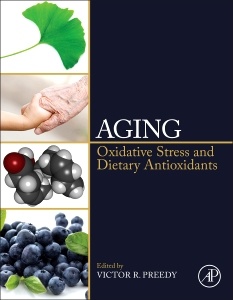Aging Oxidative Stress and Dietary Antioxidants
Coordonnateur : Preedy Victor R

Aging: Oxidative Stress and Dietary Antioxidants bridges the trans-disciplinary divide and covers in a single volume the science of oxidative stress in aging and the potentially therapeutic use of natural antioxidants in the diet or food matrix. The processes within the science of oxidative stress are described in concert with other processes, such as apoptosis, cell signaling, and receptor mediated responses. This approach recognizes that diseases are often multifactorial, and oxidative stress is a single component of this.
Gerontologists, geriatricians, nutritionists, and dieticians are separated by divergent skills and professional disciplines that need to be bridged in order to advance preventative as well as treatment strategies. While gerontologists and geriatricians may study the underlying processes of aging, they are less likely to be conversant in the science of nutrition and dietetics. On the other hand, nutritionists and dietitians are less conversant with the detailed clinical background and science of gerontology. This book addresses this gap and brings each of these disciplines to bear on the processes inherent in the oxidative stress of aging.
1. Skin aging and oxidative stress 2. Sarcopenia and oxidative stress 3. Ovarian aging and oxidative stress 4. The brain in aging and oxidative stress 5. Alzheimer’s disease and oxidative stress 6. The heart, aging and oxidative stress 7. Age-related changes in the cardiovascular system 8. The immune system in aging and role of oxidative stress 9. The lung in aging and oxidative stress 10. Diseases of aging: Cancer and oxidative stress 11. Skin aging and vitamin C 12. Aging skin and natural estrogenic antioxidants 13. Nutricosmetics and skin aging 14. Antioxidant nutrition and sarcopenia 15. Magnesium, oxidative stress and aging muscl 16. Ascorbic acid in postmenopausal women and artery compliance 17. Effects of tocopherol supplements on menopausal disorders 18. Antioxidant aspects of plum to treat menopausal symptoms and effects on body systems 19. Statins and reduction in oxidative stress in aged brain 20. Saffron and the aged brain: antioxidant aspects 21. Green tea catechins and the aging brain 22. Metals and oxidative stress in Alzheimer’s disease 23. Alzheimer's disease and plant derived melatonin 24. Antioxidants in Alzheimer's disease 25. Antioxidant vitamins and cardiovascular disease 26. Oxidative stress, carotenoids and cardiovascular protection 27. Hypertension, menopause and natural antioxidants 28. Selenium and heart disease in aging 29. Vitamin C and heart failure 30. Immune function and coffee consumption in the aged 31. Immune systems and food based strategies in the aged 32. Immune changes in aging and dietary antioxidants 33. Minerals and COPD 34. Vitamin E and lung disease in the elderly 35. Vitamins and breast cancer 36. Vitamin E and colorectal cancer 37. Coffee consumption and cancer mortality 38. Garlic extracts and cancer 39. Red wine and prostate cancer
Nutritionists, dieticians, gerontologists, and aging researchers
- Nutritionists can apply information related to mitochondrial oxidative stress in one disease to diet-related strategies in another unrelated disease
- Dietitians can prescribe new foods or diets containing anti-oxidants for conditions resistant to conventional pharmacological treatments
- Dietitians, after learning about the basic biology of oxidative stress, will be able to suggest new treatments to their multidisciplinary teams
- Nutritionists and dietitians will gain an understanding of cell signaling and be able to suggest new preventative or therapeutic strategies with anti-oxidant rich foods
Date de parution : 10-2018
Ouvrage de 316 p.
21.4x27.6 cm
Ancienne édition
Accéder à la nouvelle édition.
Date de parution : 03-2014
Ouvrage de 316 p.
21.4x27.6 cm
Ancienne édition
Accéder à la nouvelle édition.
Thèmes d’Aging :
Mots-clés :
ß-amyloid; A20; Alzheimer's disease; Alzheimer's disease; C12TPP; CTX; DNA repair; NF-κB; NTX; ROS; SkQ1; SkQR1; T helper function; aging; aging related diseases; aging skin; aldosteronism; alpha-amylase; alpha-glucosidase; antidepressants; antioxidant; antioxidant agents; antioxidant defenses; antioxidant supplementation; antioxidant therapy; antioxidants; arthritics; bone turnover markers; cardiomyocyte necrosis; cardiovascular disease; cardiovascular diseases; chronic inflammation; clinical trial; coenzyme Q10; cognitive impairment; cohort study; congestive heart failure; coronary heart disease; critical care; curcumin; degenerative diseases; depression; diet; dietary antioxidants; elderly; elderly women; enteral nutrition; estrogen; estrogen receptor ß; free radical; free radical scavenger; free radicals; functional longevity; glucose metabolism; healthspan; herbs; herbs and spices; hippocampus; hyaluronic acid; hypericin; hypertension; immune system; inflammation; inflammatory cytokines; intracellular calcium overloading; ions; ischemia; isoflavones; leukocytes; lipid peroxidation; liver disease; long-term potentiation; lycopene; magnesium; magnesium deficiency; melatonin; menopause; metabolic syndrome; micronutrients; mitochondria; mitochondria-targeted antioxidants; mitochondrial DNA; mitochondrial bioenergetics; mitochondrial dysfunction; muscle; muscle performance; neurodegeneration; neurons; neurotransmission; nondietary antioxidants; osteoporosis; oxidative homeostasis; oxidative stress; phenolic phytochemicals; phenols; physical performance; phytochemicals; polyphenols; postmenopausal women; protein cross-linking; quercetin; reactive oxygen species; reactive oxygen species (ROS); redox balance; s-equol; sarcopenia; seaweeds; secondary hyperparathyroidism; skin atrophy; soy; spices; stroke; superoxide dismutase; therapeutic approach; trauma; tryptophan; type 2 diabetes; vegetarian; vitamin; vitamin A; vitamin C; vitamin E; whey protein; zinc



